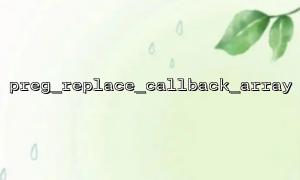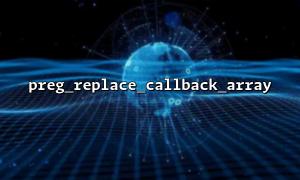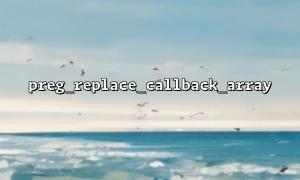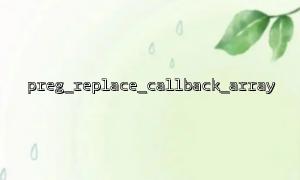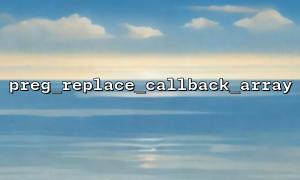In PHP, the preg_replace_callback_array function is a very powerful tool that enables handling multiple regular expression replacements through callback functions. It is widely applied in various text processing tasks. Today, we will introduce how to use the preg_replace_callback_array function to replace special tokens in code comments and transform these tokens into corresponding document content. This is particularly useful for code documentation and automatic generation of comments.
The preg_replace_callback_array function is a built-in PHP function used to perform multiple regular expression replacements. It accepts two main parameters:
patterns: An array where each element is a regular expression used to match text.
callback: A callback function that defines how to handle the matched content.
When a regular expression matches text, the callback function is triggered, receiving the matched content as a parameter, and it can return the replacement string.
Suppose code comments contain special tokens that need to be replaced with certain document content. For example, the comments include the token {{DOC_URL}}, which we want to replace with an actual URL.
Here is a simple example demonstrating how to use preg_replace_callback_array to accomplish this task:
<?php
<p>// Original code<br>
$code = <<<EOT<br>
// {{DOC_URL}}: <a rel="noopener" target="_new" class="" href="http://example.com/docs">http://example.com/docs</a><br>
// This is a sample comment with a special token.<br>
EOT;</p>
<p>// Define regex patterns and callback functions<br>
$patterns = [<br>
'/{{DOC_URL}}/' => function($matches) {<br>
return '<a rel="noopener" target="_new" class="" href="https://m66.net/docs">https://m66.net/docs</a>';<br>
},<br>
'///(.*?)/' => function($matches) {<br>
// Process the comment and convert it to document content<br>
return "Document: " . trim($matches[1]);<br>
}<br>
];</p>
<p>// Perform replacements using preg_replace_callback_array<br>
$replacedCode = preg_replace_callback_array($patterns, $code);</p>
<p>// Output the replaced code<br>
echo $replacedCode;</p>
<p>?><br>
Code block definition: We used <<
Regular expression array: We defined an array containing two regular expressions:
The first regex /\{\{DOC_URL\}\}/ matches {{DOC_URL}} and replaces it with https://m66.net/docs.
The second regex /\/\/(.*?)/ matches comment content, extracting it and converting it into document content.
Callback functions: For each matched text by the regex, the corresponding callback function is invoked to process the matched content.
For the {{DOC_URL}} token, we replace it with a new URL: https://m66.net/docs.
For the comment text, we convert it into document format and return the processed string.
Output result: After replacement, the comment tokens and special content in the code have been successfully transformed into document format.
In the example above, we have replaced the {{DOC_URL}} token with https://m66.net/docs, demonstrating how to replace special tokens in comments and convert them into actual document content. Depending on your needs, you can replace other URL domains according to specific rules or perform more complex transformations on tokens within comments.
preg_replace_callback_array provides a very flexible way in PHP to handle multiple regular expression replacements. By using callback functions, we can not only replace simple tokens but also perform complex processing and transformation on matched content. For scenarios requiring automatic generation of documentation or replacement of special tokens in comments, preg_replace_callback_array is a highly effective tool.
With the example above, you should now understand how to use this function to replace special tokens in code comments and convert them into document content. If your project has similar needs, this approach can serve as a useful reference.





